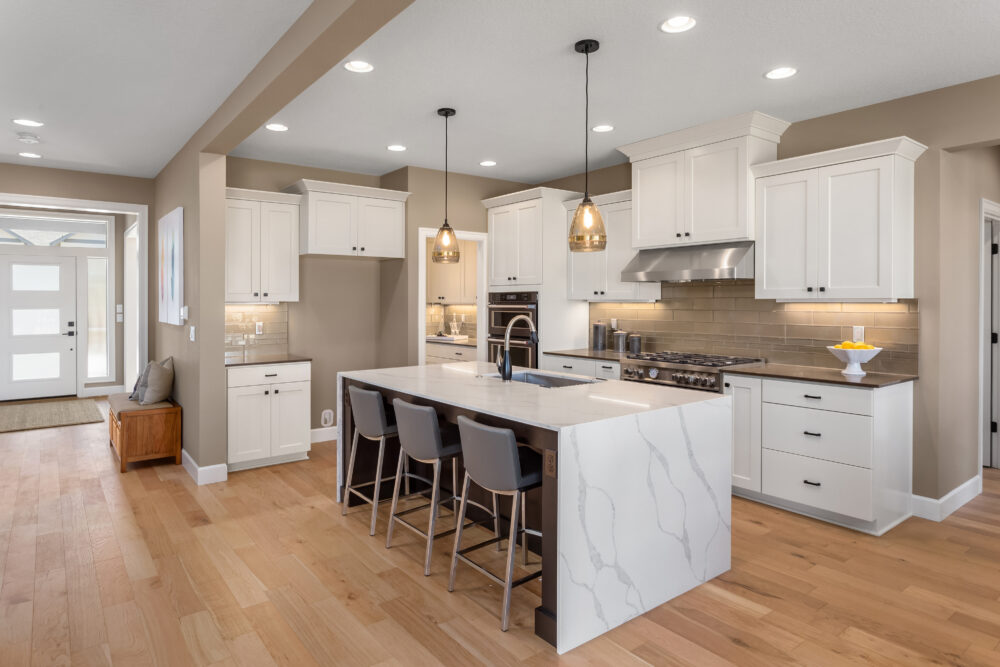Heat Resistance of Marble and Quartz: What You Need to Know
Every day, the average kitchen countertop experiences temperature fluctuations that would surprise most homeowners. From scorching cookware reaching 400°F to ice-cold beverages creating condensation, your countertops silently withstand thermal extremes that would damage lesser materials. At Moreno Granite, we’ve helped countless homeowners navigate the important decision between marble and quartz countertops, with heat resistance being a critical factor in that choice.

Marble’s Heat Resistance Properties
Marble countertops have graced elegant homes for centuries, and for good reason. Formed under intense heat and pressure deep within the earth, marble possesses natural heat resistance that makes it a reliable kitchen companion.
How Marble Handles Heat
Marble can typically withstand temperatures up to 480°F before showing signs of damage. This natural stone has excellent thermal conductivity, meaning it efficiently distributes heat rather than concentrating it in one spot. When a hot pan touches marble, the heat disperses throughout the stone rather than creating a focused point of damage.
However, marble isn’t invincible. Sudden, extreme temperature changes—known as thermal shock—can cause marble to crack. Additionally, prolonged heat exposure might discolor the stone or damage the sealant that protects your marble countertop from stains.
Real-World Performance
In practical terms, marble will handle a hot pan placed directly on its surface for a brief period without immediate damage. That said, professional stone experts still recommend using trivets or hot pads to preserve your marble’s beauty for years to come.
Quartz’s Heat Resistance Capabilities
Unlike marble, quartz countertops are engineered stone products—typically composed of about 90% ground natural quartz combined with resins and pigments. This engineered nature gives quartz different heat resistance properties than natural stone.
How Quartz Responds to Heat
Quartz countertops generally withstand temperatures up to about 300°F before risking damage. The resin components that bind the quartz particles together are responsible for this limitation. These polymers begin to soften when exposed to high temperatures, potentially causing permanent discoloration or warping of your countertop.
The non-porous surface of quartz offers excellent stain resistance, but ironically, this same quality makes heat damage more immediately noticeable when it occurs. Once heat damages quartz, repair options are limited compared to natural stone.
The Practical Kitchen Test
For everyday cooking activities, quartz performs admirably. It handles warm plates, hot serving dishes, and brief contact with moderately hot items without issue. However, direct contact with cookware from the oven or stovetop poses significant risk of permanent damage.
Comparing Heat Performance: Marble vs. Quartz
When directly comparing these popular countertop materials, several key differences emerge:
Temperature Threshold
Marble edges out quartz in maximum heat resistance (480°F vs. 300°F). This difference matters when considering your cooking habits and kitchen workflow.
Heat Damage Appearance
Heat damage on marble often manifests as etching or discoloration that can sometimes be professionally restored. On quartz, heat damage appears as permanent discoloration, melting, or cracking that typically requires countertop replacement.
Long-Term Considerations
Marble may require more general maintenance than quartz, but it offers better heat endurance and can often be restored if damaged. Quartz demands vigilant heat protection but requires less day-to-day maintenance.
Making the Right Choice for Your Home
The ideal countertop material balances your aesthetic preferences, lifestyle needs, and maintenance expectations. For households where cooking enthusiasts regularly work with extreme temperatures, marble’s superior heat resistance might edge out quartz. For busy families seeking low-maintenance elegance, quartz’s overall durability might outweigh its heat limitations.
At Moreno Granite, we believe informed homeowners make the best decisions for their unique spaces. Our experienced design consultants can help you evaluate all factors—including heat resistance—to select the perfect countertop material for your kitchen or bathroom project. Contact Moreno Granite today for a personalized consultation and discover the perfect balance of beauty and function for your home’s stone surfaces.
